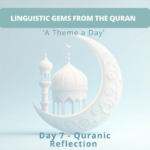
Quranic Reflection:
Allah says in Surah Muhammad, verse 24
أَفَلَا يَتَدَبَّرُونَ ٱلْقُرْءَانَ أَمْ عَلَىٰ قُلُوبٍ أَقْفَالُهَآ
Then do they not reflect upon the Qur’ān, or are there locks upon [their] hearts?
He also says in Surah al-Mu’minoon, verse 68
أَفَلَمْ يَدَّبَّرُوا۟ ٱلْقَوْلَ أَمْ جَآءَهُم مَّا لَمْ يَأْتِ ءَابَآءَهُمُ ٱلْأَوَّلِينَ
Then have they not reflected over the word [i.e., the Qur’ān], or has there come to them that which had not come to their forefathers?
The translation of both verses effectively communicates to us the message that we should reflect on the Qur’an, but what the translations belie is that the Arabic word used by Allah is not the same in both verses.
The original form of the word has been used in Surah Muhammad – يَتَدَبَّرُونَ yatadabbaroona – but in Surah al-Mu’minoon, a shortened, amalgamated version has been used – يَدَّبَّرُوا۟ yaddabbaroo.
To understand the reason for this each word must be viewed in the context of the verse in which it has been mentioned.
The word يَتَدَبَّرُونَ yatadabbaroona, as it appears in Surah Muhammad, is based on a verb form that has connotations of of intensification and repetition. In this verse it is used in the context of addressing the hypocrites who have turned their backs on Islam after repeatedly hearing the Qur’an, thus they need to repeatedly turn back to the Qur’an and contemplate and deeply and intensely think about its messages and meanings.
There is also harmony between mentioning the Qur’an, using the full word, in its totality (as opposed to mentioning a verse of it, or using another word for it), and mentioning the word yatabbaroona using the full word.
The word يَدَّبَّرُوا۟ yaddabbaroo in Surah al-Mu’minoon, on the other hand, is a condensed version of the same word. But if we look at the context we see it is speaking about the disbelievers who never became Muslim, despite having ‘the word’ (rather than ‘the Qur’an’ as in 47:24) recited to them – this could refer to a single word, a verse, part of a verse, or the whole Qur’an. But thus it was more befitting for a truncated version of the word be used – يَدَّبَّرُوا۟ yaddabbaroo – to harmonise with what could have been a lesser amount of Qur’an that they were exposed to.
Additionally, the amalgamation of the letters which has led to there being two letters with a shaddah following one another, lends the word to have a stronger, more harsh sound to it, and in this is also a stronger, more harsh demand upon them to reflect, however little it may be.
